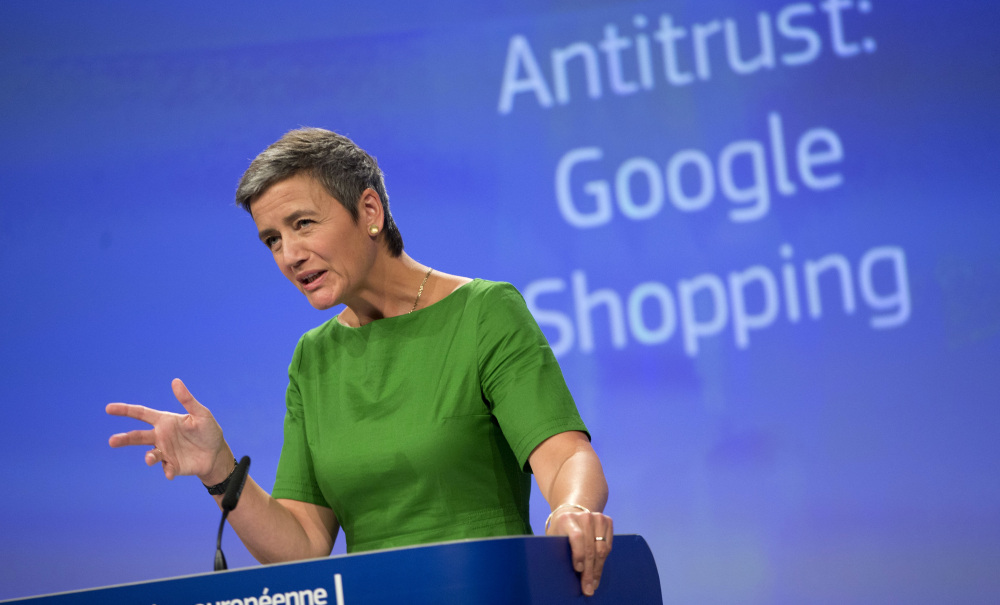BRUSSELS — The European Union’s antitrust chief hit Google with a record $2.7 billion fine Tuesday while warning that other parts of Google’s business were in the cross hairs.
The European Commission, led by a former deputy prime minister of Denmark, said Google had illegally taken advantage of its juggernaut standing in the world of search engines, pushing users toward its comparison shopping service and advertisers over those of rivals.
The fine is the largest the European Union has levied against a company for abusing its dominant position, and marked the latest confrontation over business practices among EU regulators and American tech giants. Google could face dizzying additional penalties if it loses an expected appeal and fails to comply.
If the ruling stands, it could reshape the company’s behavior in one of its most lucrative markets. And the way Google presents its search results could shift worldwide.
The landmark EU decision also sets up a wider clash – touching on whether government regulators hold power over one of the world’s most dominant companies, and testing the limits of competition-regulating rules in an age of borderless commerce and online interactions.
“Google has abused its market dominance in its search engine by promoting its own shopping comparison service in its search results and demoting its competitors,” EU competition chief Margrethe Vestager told reporters in Brussels. “What Google has done is illegal under EU antitrust rules. It has denied other companies the chance to compete on the merits and to innovate. And most importantly, it has denied European consumers the benefits of competition.”
The decision reinforced Vestager’s emerging role as the world’s most aggressive antitrust regulator, following on a $14.6 billion back-tax judgment against Apple last year.
Google – which is considering an appeal – issued a statement minutes after the EU announcement, claiming the company’s shopping site helps both consumers and advertisers.
“When you shop online, you want to find the products you’re looking for quickly and easily. And advertisers want to promote those same products,” Google senior vice president and general counsel Kent Walker said in a written statement.
“That’s why Google shows shopping ads, connecting our users with thousands of advertisers, large and small, in ways that are useful for both. We respectfully disagree with the conclusions announced today,” Walker said. “We will review the commission’s decision in detail as we consider an appeal.”
Under European rules, it is up to Google to find a way to comply with the judgment, and Vestager offered no specific guidance about how it must modify its services.
If it does not abide by the ruling within 90 days, however, Google could face penalties of up to 5 percent of the daily turnover of Alphabet Inc., its corporate parent, which could be backdated for years.
“This is really sending a message to Google: change or we’ll come after you,” said Thomas Tindemans, chairman of the Brussels office of Hill+Knowlton Strategies, a consultancy, who has worked on previous technology antitrust cases.
Europe’s vast unified market gives regulators extra clout as they take on international business titans. With more than 500 million residents, the 28-nation bloc has more consumers than the United States. And its regulations about fair business practices tend to be stricter than Washington’s, meaning U.S. tech companies are often a focus.
The holder of the previous record fine was Intel, the chip manufacturer, which was hit with a $1.2 billion penalty in 2009.
The European Commission directed Google to open up its shopping search results to the tech company’s competitors.
“They’re going to have to change their conduct,” said Thomas Vinje, legal counsel to FairSearch, a lobbying group that has helped organize the legal challenge to Google in Europe.
And as President Trump advocates a fierce America-first policy of trade protectionism, the ruling also raised questions about how his administration would respond to the broadside hit against one of the richest companies in the United States. The answer was not immediately clear.
Trump’s own relationship to the tech industry has become strained amid decisions to impose travel restrictions on some Muslim majority countries and to withdraw from the Paris climate agreement, two issues that clash with Silicon Valley’s socially liberal culture. But several U.S. companies, including Yelp and Expedia, were official complainants in the European case against Google, dampening the Europe vs. America dynamic.
A White House spokesman declined to comment on the EU case against Google, saying the administration would take no position on pending litigation.
Yelp said Tuesday that it had not decided whether to press its case against Google before U.S. regulators. “We are going to leave all options on the table,” said Luther Lowe, Yelp’s vice president of public policy.
Send questions/comments to the editors.



Success. Please wait for the page to reload. If the page does not reload within 5 seconds, please refresh the page.
Enter your email and password to access comments.
Hi, to comment on stories you must . This profile is in addition to your subscription and website login.
Already have a commenting profile? .
Invalid username/password.
Please check your email to confirm and complete your registration.
Only subscribers are eligible to post comments. Please subscribe or login first for digital access. Here’s why.
Use the form below to reset your password. When you've submitted your account email, we will send an email with a reset code.